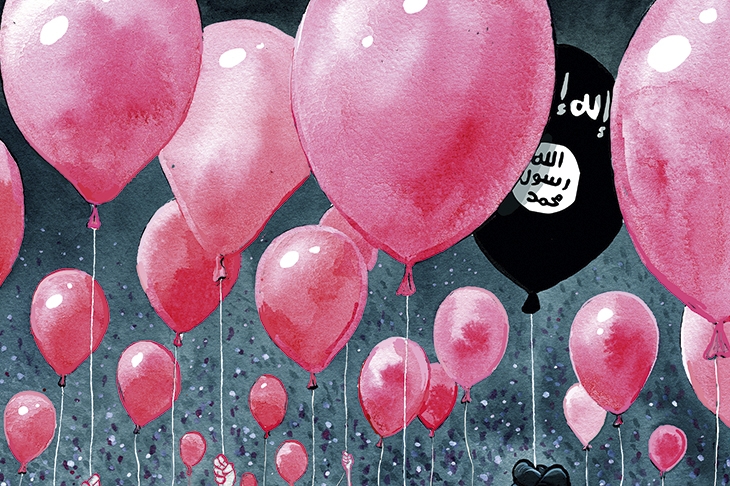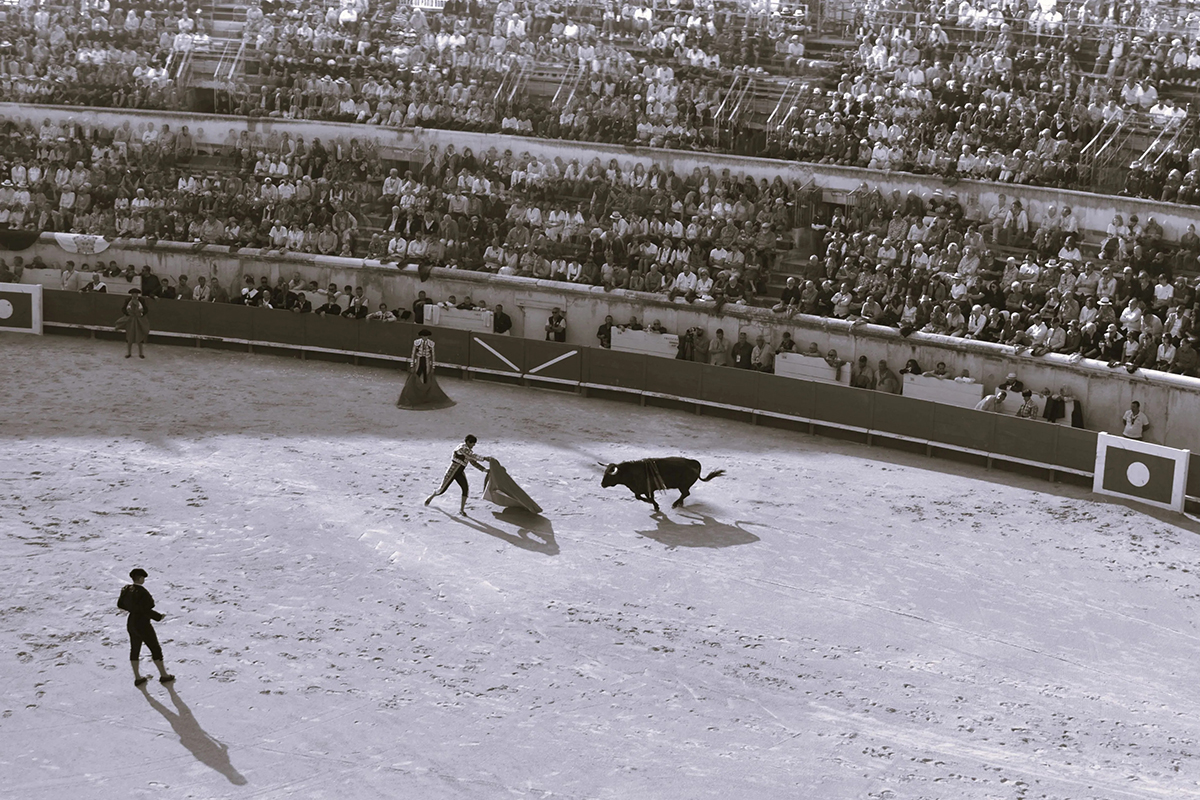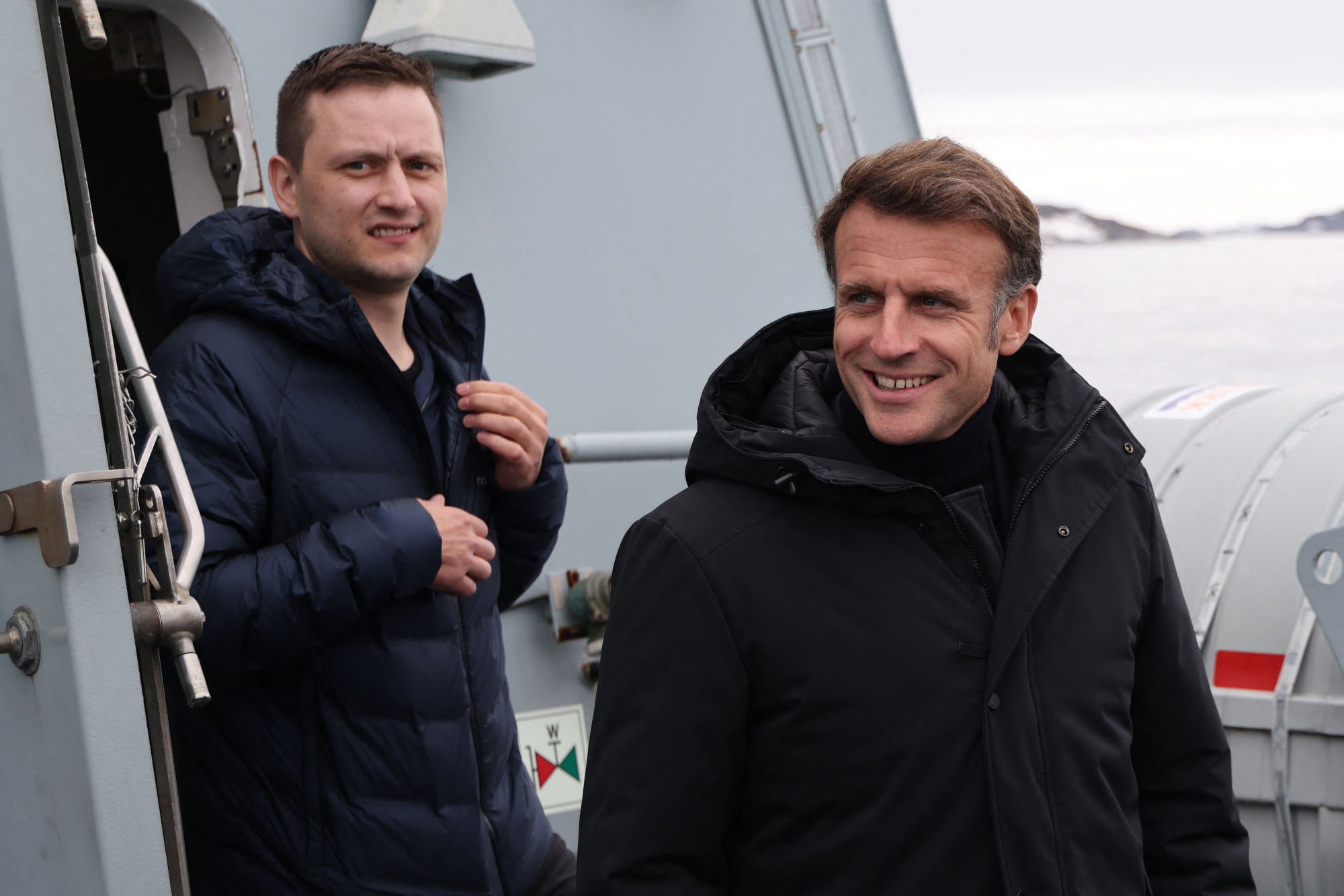Montpellier
France is under attack. Two weeks ago, Samuel Paty, a middle school teacher, was decapitated in a leafy suburb of Paris after showing his students cartoons of the prophet Mohammed published by Charlie Hebdo in 2015. Last week, there were three killings at the Basilica of Notre-Dame in Nice, and after that, an Orthodox priest in Lyon was shot and gravely wounded. ‘Tell my children I love them,’ were the dying words of Simone Barreto Silva, a 44-year-old mother of three and herself an immigrant, killed in Nice.
France has gone to ‘war’ with Islamic ‘separatists’, Interior Minister Gérald Darmanin has claimed. The police have been rounding up the usual suspects, but with 20,000 individuals on the watch lists of the intelligence services, and hundreds of radical mosques breeding more, these are gestures.
Yet if this is a war, the Republic is hardly winning. Darmanin admits there will be further attacks, and is thin on the details of how they will be countered. Michel Houellebecq, in his 2015 novel Submission, predicted that the French establishment is ultimately more likely to collaborate with Islamists than seriously confront them. A French friend reminds me: ‘We’re not very good at winning wars.’
Last month, before the latest spate of violence began, President Emmanuel Macron delivered an exceptionally robust speech against Islamists, provoking furious protests from Muslims and western liberals. After the attacks, he further infuriated many Muslims by specifically reiterating his defense of the freedom to blaspheme.
Macron’s discourse is as politically expedient as it is a reflection of conviction, a swerve to the right as the 2022 presidential campaign approaches. Either way, his words have been exceptionally tough. Using language impossible to imagine being used in today’s Britain, he identified the core problem as ‘Islamic separatism…a politico-religious project…to create an alternative society…whose final goal is to take control’.
Islam, he declared, is a religion ‘in crisis…plagued by radicalism and by a yearning for a reinvented jihad, the destruction of the “other”’. France shares responsibility, itself a ‘separatist society of ghettos’ concentrating ‘misery and hardship’ where the promise of liberty, equality and fraternity has not been kept.
His analysis is solid, but thin on proposed remedies. It is entirely unclear how Macron intends to prosecute this war. He’s mobilized soldiers to reinforce the police, but this is mere theater. The army is thinly stretched after six years of inconclusive struggle against Islamists in the Sahel. The home garrison is neither trained nor equipped for policing, nor even considered especially reliable. The police themselves are poorly paid and demoralized. Static defense to mobile terrorism seems in any case tantamount to a Maginot Line deployed against an ideology.
Macron’s ghettos, where the lockdown is ignored, are restless. The cities and villages are on edge. Gun club membership has tripled as many citizens, including women, seek the permits to arm themselves.
France had enough of a problem with its own alienated citizens, not to overlook the Chechens, Tunisians and Syrians who continue to arrive. Thanks to the open borders of Schengen, frontiers hardly exist, thousands of suspected militants circulate almost invisibly, and the latest Nice terrorist arrived by train from Italy, which he’d reached from Tunisia after being picked up by a humanitarian organization in the Mediterranean.
Some ask how Macron can lock down the country against a virus, yet terrorists seem free to roam at will. A poll last week by Fiducial/Odoxa for Le Figaro revealed 26 percent of voters have confidence in the government to deal with terrorism. That’s down 7 percent in a week, and 18 percent since July.
Éric Ciotti, a senior Républicain party deputy for the Alpes-Maritimes, has demanded a ‘French-style Guantánamo’ to detain people flagged as risks but not convicted of specific crimes. ‘Islamic fascism is a virus,’ said Christian Estrosi, mayor of Nice. ‘We have permanent bombs on our territory that could explode at any moment.’
It’s a popular argument, if far-fetched, to imagine France could export its problem to the currently abandoned Devil’s Island, just off the coast of equatorial French Guiana, the notorious Bagne de Cayenne where Alfred Dreyfus was imprisoned and Henri Charrière, a writer and convicted murderer, gathered the material for Papillon.
Article 16 of France’s constitution of the Fifth Republic states that where the institutions of the Republic, the independence of the nation or the integrity of its territory are under serious and immediate threat, the president shall take measures required by these circumstances. This power is sweeping and was last used by General de Gaulle in 1961 during the war in Algeria. But does the current president have the will to match action to his rhetoric?
If a French Guantánamo might theoretically be constitutional, it’s unlikely to be practical. It would provoke an almighty backlash or even an uprising in the unstable cités. There is plenty of potential for such a conflict to spill beyond the borders, not least to the UK, Belgium and Germany. Does Macron have any other ideas?
It is from antecedents such as the murderous anticlericalism of the Revolution itself that the French seem preternaturally attached to secularism (laïcité) including the ironically sacrosanct nature of blasphemy. With the Revolution, which included the widespread killing of priests and nuns, France replaced worship of God with worship of the state, an extreme secularism with its own holy trinity of liberté, egalité and fraternité.
But this idea of secular France, which has squashed the nation’s cultural and religious Catholicism, is also a weakness. It’s incompatible with proselytizing Islam, where the overwhelming majority of believers, even those unlikely to commit violence themselves, cannot accept any justification for insulting their prophet. That alienated, uneducated, unemployed young men are prepared violently to defy the Republic in defense of their religion is not startling. With an estimated six million Muslims in France, and more arriving all the time, there is a plentiful sup- ply of potential jihadists. Six of the last 20 terror attacks have been committed by recent immigrants.
Reaction in the Muslim world to Macron’s speech and his subsequent elaborations has been predictable. President Erdogan of Turkey pronounced Macron to be a mentally deranged Islamophobe. Mobs took to the streets across the Arab world and the subcontinent. In London, demonstrators chanted ‘Allahu Akbar’ outside the French embassy and even the West End store of a French-owned retailer of expensive handbags.
After 130 rock fans were slaughtered at a Paris music venue, Jewish schoolchildren shot dead at their school in Toulouse, 86 killed in the 2016 Bastille Day attack in Nice, a priest murdered on his altar in Normandy and the slaughter of a dozen journalists at Charlie Hebdo, the government insists it’s thwarting plots on a daily basis. But the evidence for these claims is hard to judge.
[special_offer]
On Monday, French children returned from their half-term. Schools were told to devote the morning to ‘reinforced’ civics instruction, in homage to Samuel Paty. Yet head teachers warned that in many schools with large numbers of Muslim students the planned lessons would be disrupted. It was feared some pupils would record these on their phones and post the clips on YouTube, embarrassing the President.
Cue the predictable U-turn. There would be a minute’s silence and an hour’s lesson, but it was not attempted everywhere. In some of the most sensitive schools, the silence was observed only in staff rooms.
If the French state is scared of high school students, what chance has it got?
This article was originally published in The Spectator’s UK magazine. Subscribe to the US edition here.

























